Yachting Monthly
- Digital edition
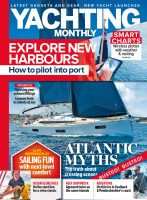
How to pass your Yachtmaster exam
- Chris Beeson
- September 16, 2015
The global standard of sailing qualifications is achievable for any experienced, competent skipper. Tom Cunliffe explains how to pass your Yachtmaster exam
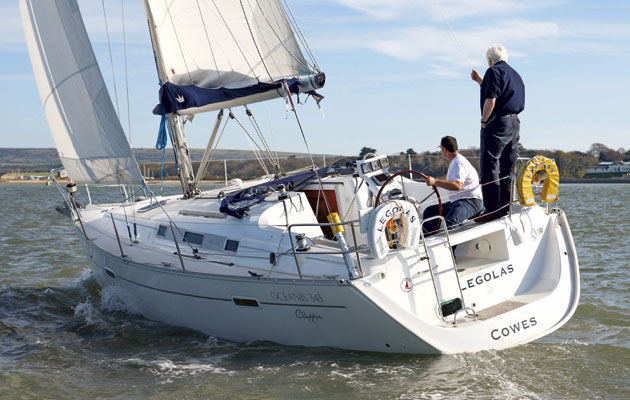
The only certificates accepted by the authorities are those issued after an at-sea examination. To become a fully-fledged Yachtmaster, the practical test is the only one that counts Credit: Graham Snook/YM

Tom Cunliffe is an RYA Yachtmaster examiner. He has passed and failed hundreds of Yachtmaster candidates over the years
We in the UK are exceedingly fortunate. Just as the English language is the best bet for a world traveller, our very own RYA/MCA Yachtmaster qualification happens to be the global standard for sailing. It’s required for anyone planning to become a professional and, thanks to the continuing efforts of the RYA, Brits who sail for leisure still don’t have to carry any proof of competence in home waters. Despite this blessed lack of regulation, the Yachtmaster certificate remains the logical target of many a self-motivated sailor. It also represents the icing on the cake for those looking for the reassurance of an external assessment.
Courses and exams
Yachtmaster training can take place on a boat or in a classroom. A shore-based course, either at desks in a school or via the increasingly popular Internet distance learning programmes, ends with a Yachtmaster theory exam. Success in this will help a student in subsequent qualification upgrades, but it is not officially recognised. The only certificates accepted by the authorities are those issued after an at-sea examination – the Yachtmaster Practical . To become a fully-fledged Yachtmaster, this practical test is the one that really counts.
Yachtmaster Prep

Meteorology matters: a favourite with examiners is to produce a weather map and invite you to analyse it. Be ready and know your subject
This is a non-RYA course and, as such, has no official status or syllabus. However, it is run successfully by many RYA sailing schools to prepare candidates for an examination which generally follows on at the end. Up to four students spend several days together on the boat in which they will be examined. The benefits are that they get to know one another and their yacht under the guidance of a highly qualified Yachtmaster Instructor. The general feeling is that these tutors can’t teach you much you don’t already know in a week, but that they are very good at coaching the best out of those skills you already have. Prep courses are great for brushing up on how to jump through the various hoops an examiner may set up. What they can’t do is make someone who doesn’t have suitably constructive mileage into the confident skipper examiners are looking for.
Coastal or Offshore – what’s my level?
Recently, the old Coastal Skipper ticket has been superseded by the new ‘Yachtmaster Coastal’ certificate. The qualifying mileage for this MCA-recognised qualification is 800, with passage and night-hour requirements being relaxed in comparison with ‘Yachtmaster Offshore’, which keeps its 2,500-mile entry level. Either is a proper Yachtmaster qualification and can be described as such. Only the often-dropped suffix distinguishes the two. The syllabi are identical, the variant is the rigour of the examination. Apply for ‘coastal’ and the examiner, recognising that you have less sea-time, will be more inclined to cut you a bit of slack.
The RYA has noted that most candidates are really only making ‘coastal-status’ passages. In real terms, this includes an annual trip across the Irish Sea, the North Sea or the Channel in a calculated weather window, which is very different from setting off from Ramsgate towards Norway with five days and potentially serious conditions ahead of you. The implications should be clear: unless you need the Offshore ticket for professional reasons, if in doubt, go for Coastal.
Preparing yourself and the boat
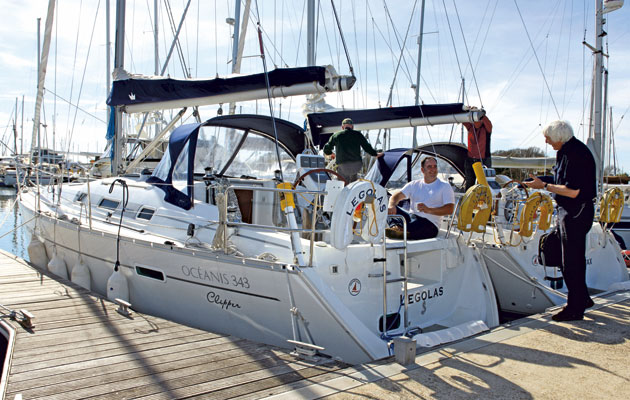
A relaxed candidate with a mug of tea makes a better impression than a harassed-looking one
If you’ve signed on with a sailing school, you’ll be stuck with the boat you’re given. You can be confident that this yacht ticks all the official boxes by being coded for commercial use, but while some are very up-together, others are not. If the boat is generally sloppy and scruffy, you can at least make an effort to stow the mainsheet in a seamanlike manner while you are nominally skipper.

Neatly coiled lines reflect well on the skipper
You can also ensure that fenders are hung at the same level, sharpen up the guardrails and see that things generally look as though somebody knows the difference and cares. Then the examiner won’t hold the ratty lifebuoys and the smelly bilge against you.

Mind that your dress and demeanour don’t make a bad first impression
Try to be ready in good time so that you aren’t involved in a last-minute kerfuffle. If you’re relaxing in the cockpit with a mug of tea when the examiner arrives, he or she will be more impressed than if you’re frantically working out tidal heights and scuffling through the chart table. Wear sensible kit. Don’t worry if it’s not this season’s fashion. My examiner turned up in an old duffel coat back in 1978 and I think I was wearing a canvas smock and a flat cap, but the smock was freshly laundered and the cap was right way round…
The main thing is that you can sail, but an examiner is always pleased to be freed of any hassle with the paperwork. Most of us are no better with admin than you are, so make our lives easy by producing an up-to-date first aid ticket and all the rest, plus a cheque made out to the RYA – not the examiner, perish the thought!
Passage planning

Your passage plan should be realistic. Keep it simple and be ready to adapt and update as things develop
You may be given the opportunity to produce a passage plan before the examiner arrives. If so, make it realistic. Don’t plot every course to the last degree. After all, you don’t know what speed you’ll make or what the wind will really do. Check tidal gates, distances, viable alternatives and the weather. Look at any hazards, sort out a time to leave and have a plan for updating as things develop. That’s about what you’d do if there were no exam, and that’s what I, at least, want to see.
Examination on your own boat
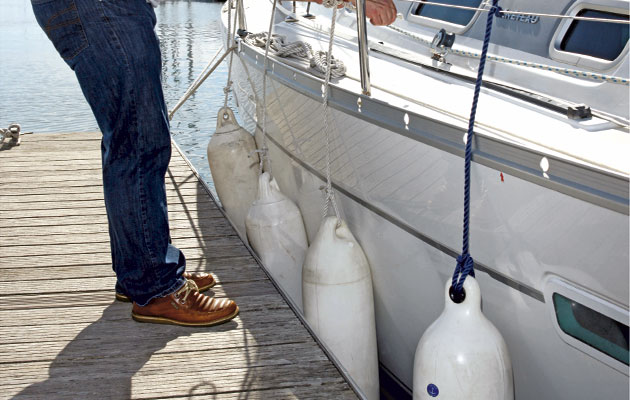
A nicely level line of fenders sends a good signal to the examiner
You don’t have to go to a sailing school to be a Yachtmaster. I love it when a candidate asks to be examined without training on his own boat. Don’t worry if she isn’t coded. There’s no legal requirement that she should be. Most of mine haven’t been either, and I couldn’t care less.
As an examiner, I want to see that your priorities are sound and that you’re thinking clearly and for yourself. On the day, the yacht must be clean, tidy and seamanlike. Waterline crisp, sail covers Bristol fashion, not looking like some poor bird with a broken wing, ropes carefully stowed, a comprehensive chart kit for the waters to be sailed, the makings of a meal plus snacks and, of course, everything that counts should be working.
What the examiner is looking for
Feeling relaxed in close quarters

Competent, confident boathandling counts well in your favour
If there’s one thing that will upset an examiner, it isn’t that you forgot to put on your lifejacket, it’s that he feels insecure when you begin manoeuvring in a marina. Take it from me, there’s nothing worse than sitting at the backstay wondering what you’re going to hit. If the boat slides sweetly out of her berth with everyone knowing what’s required and no shouting, then moves away easily with the examiner confident you’re in charge, that you’ve checked the next alleyway for collision risk, that your choice of speed is sensible and efficient and that it never enters his head to feel anxious, you’re well on the way to a pass after five minutes. No course can teach you this. It can only tick the box confirming you’ve managed it once or twice. The rest is up to you and your sea time.
Wind awareness
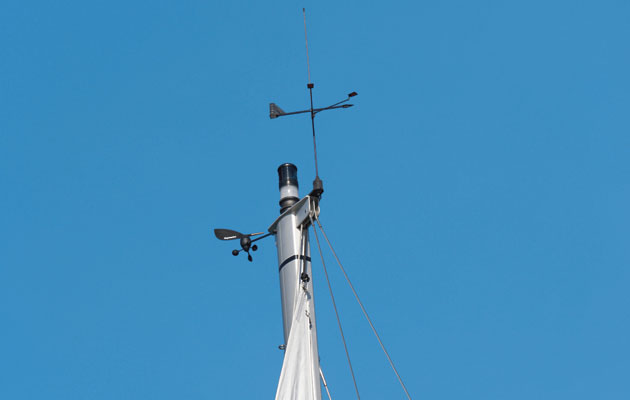
You should always be aware of the true wind direction and how it will influence any manoeuvres
Here’s another subject you can’t learn on a prep course. Knowing where the wind is and how it relates your position to any impending manoeuvres is critical. I often ask a candidate where the wind is coming from when he’s approaching a situation we both know will involve some sort of gyration under sail. If he looks instinctively at the masthead or, worse still, an instrument set to apparent wind, he’s dropped a bagful of points. At this stage, his mind should be setting up where the boat will best be placed to make her critical turns. Apparent wind isn’t going to help him much. What he should be doing is glancing at the water and noting the tiny ripples to assess what the true wind is actually doing. I’m often amazed at how many folk have never been shown how to do this. Racing sailors can handle it in their sleep, because they need to predict windshifts, but cruisers tend to get lazy, so make sure you can read the wind.
Good sailing
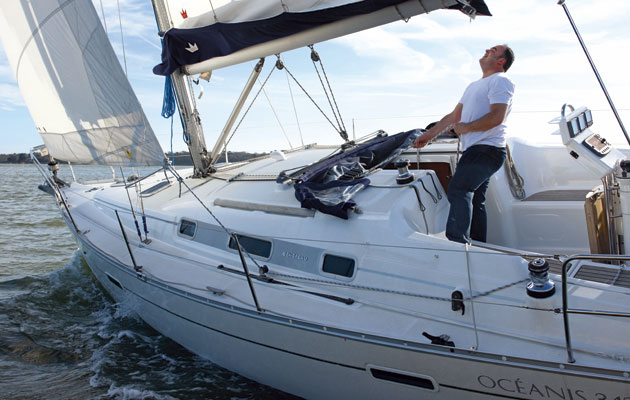
No need for incessant, race-style tweaking, but pay due attention to sail trim while the yacht is under way. If there’s a mainsheet traveller, use it
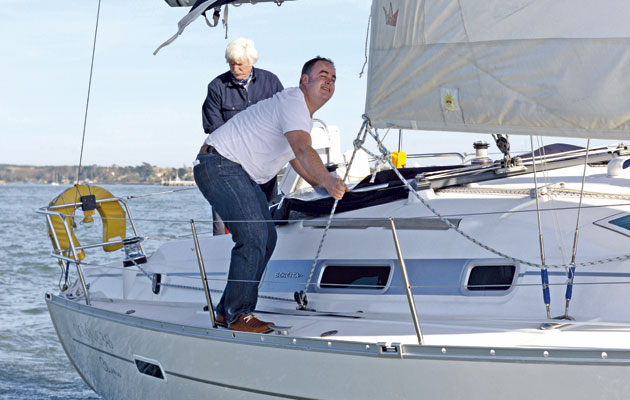
Ensure that the genoa sheet leads are properly positioned for the point of sail you’re on

Lovely: both mainsail and genoa set up with the right amounts of tension and twist
All examiners hate to see a yacht sloppily sailed on passage. Make sure that your crew are using the traveller, that genoa fairleads are properly positioned, that the main is well set up with kicker and mainsheet tension for twist. Above all, do not sail over-sheeted. It’s a dead giveaway that you just haven’t been out there enough yet.
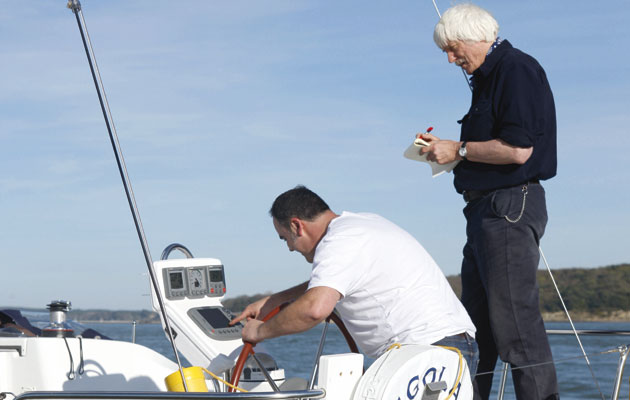
Too much staring at the plotter screen betrays nervousness
In the days before GPS set navigators free, people used to fail exams by what we called ‘sailing the chart table’ rather than skippering the yacht. Assuming the test to be all about some sort of imagined ‘correct navigational practice’, candidates nailed themselves to the navigatorium when they should have been up on deck directing operations and watching out for the ship coming up astern that was suddenly looking bigger every moment. Well, guess what? Nothing has changed. This remains a big problem with neophyte Yachtmasters.
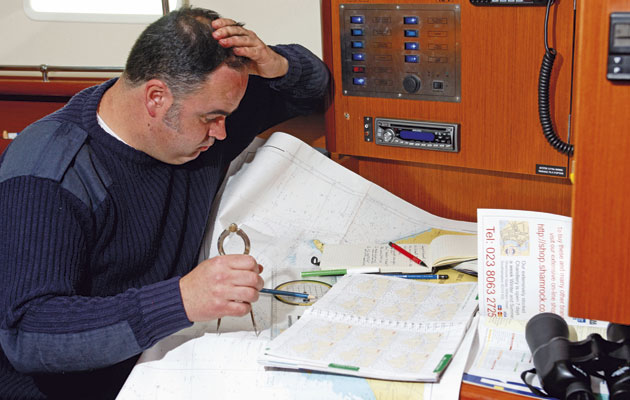
Sail the boat, not the chart table
The secret is to plan well, then nip below every so often on passage to keep an eye on what’s going on in the chart department and whizz back on deck pronto to carry on skippering the boat. I’ll lay a pound to a penny it’s what you do when there’s no examiner on board, so have the confidence to back your own usual practices. This is particularly important at night in crowded waters. An unsuccessful candidate often fails himself by allowing disorientation to creep in, simply by not keeping the true perspective on events, which can only be found on deck.
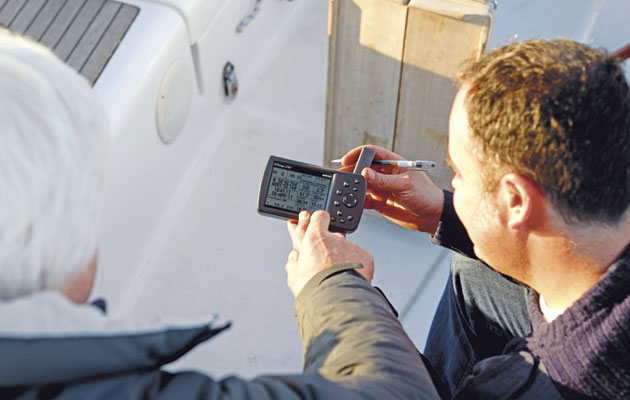
The use of electronic nav-aids such as GPS is not ‘cheating’ – it’s an integral part of navigation
All examiners have their own take on use of electronics. Personally, I want to know my candidate is making modern aids to navigation, including a chart plotter if there one, an integral part of his navigational policy. The idea, as one candidate suggested, that use of GPS is somehow ‘cheating’ is incomprehensible to me. I will almost certainly ask at some stage that the yacht be navigated classically, to see how easy my man is with what, for most people, are now backup skills. If I’m unconvinced by his performance, off he goes to think again.
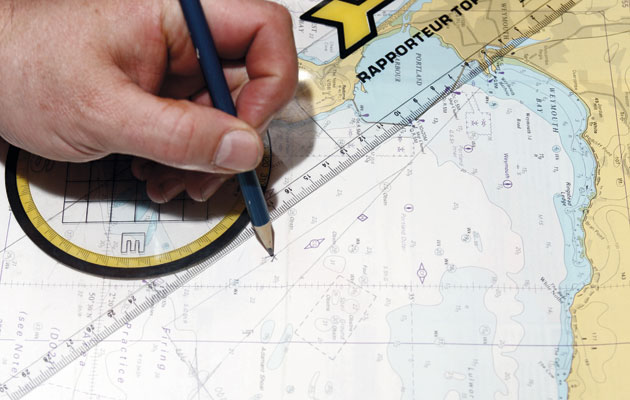
Your chartwork should be fluid and accurate
Skilled chartwork comes with use, and no amount of last-minute swotting can make up for weeks of doing it as a matter of course. Plotting traditional fixes is a good giveaway these days. With GPS all around us, we only do this for real when electronics fail. I’ve seen a person take 15 minutes to select three objects from a background studded with lights, then plot the results. The yacht had moved over two miles in the meantime…

It’s absolutely vital that you maintain a decent logbook during the exam
It’s absolutely vital, whether navigating with a giant chart plotter or a Walker log, that you maintain a decent log book. Without this, if GPS fails for any reason at all, you’re lost, Mate, so is your exam, and quite right too!
Take command
One of the most important questions on most examiners’ private lists is how good the candidate is at taking charge. If he’s managing well, we probably won’t even notice that he’s in command, that his crew all know what’s expected of them and that their skipper is quietly checking that they’re doing it. Good leadership is seldom about barking orders, and never about ignoring all on board, yet leadership is what being a Yachtmaster is all about. First, you must be sufficiently comfortable with your own skill levels not to have to worry about little things like picking up a mooring. Only then can you consider what may go wrong for the poor soul on the foredeck in a gale at midnight.
The classic skills
These are what most people imagine success in an exam is based upon. Actually, these basic skills merely help an examiner build up an overall picture of the candidate. It’s generally not a hanging matter if one manoeuvre goes a bit haywire. Even a grounding is often more interesting for what the candidate does about it than for the fact that it has happened. After all, nobody is perfect, especially under the stress of an exam.
Man overboard
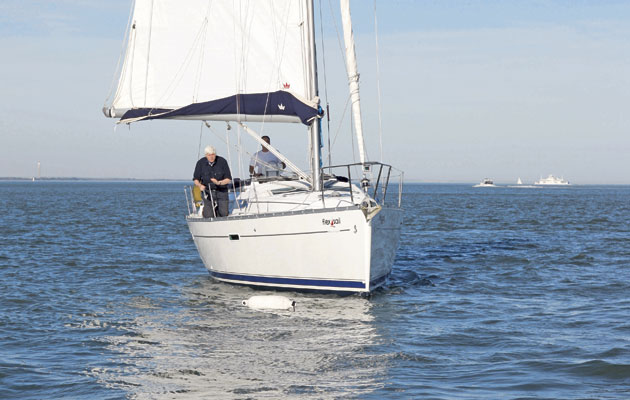
An effective, confidently executed man overboard drill speaks volumes about a candidate’s boat-handling ability but it’s not necessarily curtains if the manoeuvre goes a bit haywire
Errors in principle are not popular with examiners. Mistakes under pressure may sometimes be forgiven, and man overboard is a case in point. If the boat sails past the dummy with her mainsail full and the examiner asks, ‘What went wrong?’ It won’t get you much of a score if you reply, ‘I was going too fast.’
‘Candidate’s speciality, stating the bleeding obvious,’ the examiner will note on his pad, and move on, downhearted.
However, if you say, ‘I’m kicking myself because I was too far upwind and couldn’t de-power the main. I tried to get onto a close reach but I misjudged my approach,’ he’s more likely to take a lenient view – especially if you’ve opted for ‘Coastal’.
Securing the yacht alongside
When I was examining instructors regularly, I’d often sail up to Poole Quay (a tidal wall) shortly before closing time. I’d hop off the boat as soon as she touched the piling, saying, ‘You sort her out, skipper, I’m off for a quick pint.’ I’d then do just that. When I returned 10 minutes later, if the yacht was neatly snugged down with four lines ashore, ends on the dock, a fender board in place, sails neatly stowed and all hands below cooking and relaxing, the guy was in good shape for a pass. If I found discussions on deck about whether to ‘hand the end back for a spring’, and people blundering about in the dark, things didn’t look so bright for our hero. Have a system and know how to execute it.
… and don’t forget
Mooring and anchoring

Mooring and anchoring under sail should present no challenge to the aspiring Yachtmaster. When in doubt, drop the mainsail
These are Day Skipper skills that should pose no threat to a Yachtmaster candidate. Under sail, just remember first to assess whether the wind is with or against the tide. If you get lucky and it’s against, drop the main and arrive stemming the stream, spilling under headsail or creeping along under bare poles. If wind and tide are at all ambiguous, never forget the old adage – when in doubt, drop the mainsail.
Meteorology
As forecasting has become more comprehensive and accessible, I’ve noticed a reduction in candidates’ capacity to understand what’s going on and to read a bulletin creatively. Anyone who can’t describe the typical cloud sequence on a North Atlantic depression gets nil points from me, and failure to understand the basics of air masses is going to run up a black mark too. A favourite with examiners is to produce a weather map and invite their Yachtmaster to analyse it. Be ready, and know your subject.

Tom sees no reason not to have a chart in the cockpit, but some examiners disapprove of it. Be ready to justify your choice
Many candidates produce excellent pilotage plans for entering a strange harbour. I’m happy with that, and most examiners love it. Personally, I prefer to sketch a few notes on the actual chart and have it in the cockpit held down with a winch handle, yet I’ve met examiners who’d be horrified to see a chart on deck at all. So there you have it. Do what suits you best, then be ready to justify your choice. Actually, this advice is good across the board. The examiner wants to see what you really do, not some fantasy you’ve cooked up because you think he might like it. That is a weak candidate’s policy and it often backfires.

No shortcuts here, you just need to know your stuff – and finding the time to learn isn’t difficult
So far as the MCA is concerned, this is the crunch. Examiners are encouraged to demand high standards in this subject, and there’s no reason for a candidate, knowing full well he is to be put on the griddle, not to have the regulations burned into his heart. The best way to be exam-proof is to invest in A Seaman’s Guide to the Rule of the Road, available for modest money from all good chandlers or Bookharbour.com. Place it prominently in the heads some months before the exam and devote five minutes of the shining hour each day to digesting its wondrous contents. The book makes it easy and there’s no excuse for disappointing the Board of Trade!
For all the latest from the sailing world, follow our social media channels Facebook, Twitter and Instagram .
Have you thought about taking out a subscription to Yachting Monthly magazine?
Subscriptions are available in both print and digital editions through our official online shop Magazines Direct and all postage and delivery costs are included.
- Yachting Monthly is packed with all the information you need to help you get the most from your time on the water.
- Take your seamanship to the next level with tips, advice and skills from our expert skippers and sailors
- Impartial in-depth reviews of the latest yachts and equipment will ensure you buy the best whatever your budget
- If you are looking to cruise away with friends Yachting Monthly will give you plenty of ideas of where to sail and anchor
- "Fantastic Course to do. It gave me excellent knowledge of navigation using charts and all the inputs that go into ensuring safe passage on the sea. It was delivered the content in a clear and practical way and was of great asssistance all the way." settings Mark Wharton settings ENROL FOR THIS COURSE
- settings "I've found the training with Above & Beyond Boating really helpful, you can never be too prepared when you head out to sea and their training has helped every step of the way." settings Richard Harris settings ENROL FOR THIS COURSE
- settings "Fabulous! Neil is a great teacher; he made the course enjoyable and the whole learning process was very well supported. Neil also provided support in preparing to go cruising for the first time - very practical and reliable in advice and support. Highly recommend!" settings Jennie Fogarty settings ENROL FOR THIS COURSE
- settings "As a sailor who's cracked the podium at World Champs in SB20, 18 and 14 ft skiffs, won Cowes Week in the IRC1 and Extreme 40s and been in boats since overnighters with the folks on Lake Rotoiti as a 5 year old...I'm here to thank Neil for teaching me the many previously unknown facets of the Yachtmaster programme." settings Grant Rollerson settings ENROL FOR THIS COURSE
This e-learning course has been developed by Above & Beyond Boating. The course content covers the RYA Coastal Skipper and Yachtmaster Offshore Syllabus.
There are 12 course units, comprising of lessons and activities. Lessons are structured with dynamic content and quiz exercises, which provide immediate feedback, to test your knowledge. On completion of the course units, you will be required to complete some online assessments to receive your certificate.
The RYA course framework has been used with Australian and International scenario based case studies to ensure you finish the course with confidence to undertake coastal passages.
The course takes around 40 hours in total to study. The self-paced e-learning structure allows you to log in and work through the course material in your own time.
RYA/MCA Coastal Skipper & Yachtmaster Offshore Shorebased Course Certificate.
The RYA Coastal Skipper and Yachtmaster Offshore course builds upon the navigation, meteorology, and passage making that is delivered in the RYA Day Skipper Theory Course . This RYA training course will introduce new topics and develop a deeper understanding of familiar topics. All units of this course have an assumed prior knowledge of the RYA Day Skipper Shorebased Course.
Above & Beyond Boating is here to help! If you are not sure which course is best suited for your skills and future boating aspirations, please contact us today to discuss your pathway.
Once you have completed the twelve units of study, there are three assessment papers to complete in the online course. There is a Chartwork assessment, IRPCS assessment, and a Passage Making assessment.
When you have submitted an assessment attempt, it will be marked by a course instructor, and you will be provided with feedback. If you do not pass your assessment on your first attempt, we will provide feedback to help you prepare for another attempt. You can re-sit an exam again when you are ready.
A formal exam invigilation is required if you intend to gain an MCA large yacht qualification, such as the Officer of the Watch or Master 3000. Should you require a formal exam, we can assist with finding an RYA Training Centre in Australia, or internationally, to invigilate.
Our courses have been specifically designed for an online learning experience. Enrolment in an online course presents a flexible opportunity to work at your own pace. Our team can provide feedback, instruction and personal support to help you get the answers you need.


RYA Yachtmaster Offshore
Find out About the Yachtmaster Offshore Theory & Practical Training, (both Online & Shorebased)
Use the global Yachtmaster Offshore Directory to Find a Course Near me (Select any Location)
Page Navigation
- RYA Yachtmaster Offshore 200GT
- RYA Yachtmaster Offshore Requirements
- Course Breakdown
- RYA Yachtmaster Offshore Limited Theory
- RYA Yachtmaster of Yachts Practical Course
- RYA Yachtmaster Offshore Practical Examination
- RYA Yachmaster Offshore Certificate
- RYA Yachtmaster Offshore Commercial Endorsement
RYA Yachtmaster Offshore (Yachtmaster 200GT & 150NM Limited)
An RYA Offshore certifies an individual as competent to captain a vessel up to 24m in length and no more than 200 Gross Tonnes. The offshore certification is applicable passages during which the yacht is no more than 150 miles from harbour.
The Yacht master offshore consists of two components:
- Yachtmaster Offshore Theory
- Yachtmaster Offshore Practical
Both components can be done on an individual basis but in order to achieve a commercial endorsement for the yachtmaster offshore certificate of competency, both the theory and practical examinations must be passed.
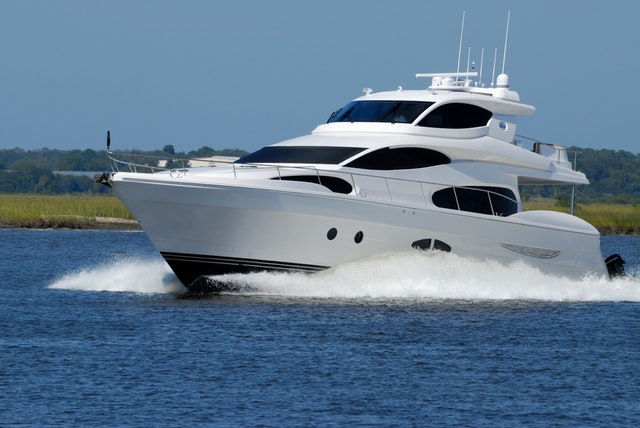
Yachtmaster Offshore Requirements:
In order to be eligible to take the Yachtmaster Offshore practical exam, candidates must meet the minimum sea time requirements.
The RYA Yachtmaster Offshore minimum sea time prerequisites are as follows:
- 50 days at sea on yachts up to 500GT
- 5 days as skipper on vessels less than 24m LOA
- 2500 miles on yachts up to 500GT
- 5 passages over 60 miles long, which must include 2 overnight passages and 2 as skipper
If a candidate already holds an RYA Yachtmaster Offshore Certificate of Competence for a different vessel type (Ie. power or sail) then the above prerequisites are adjusted as indicated on the RYA's Yacht Master Offshore Exam page.
Yachtmaster Offshore Course Breakdown
The Yachtmaster Offshore course consists of a 40-hour (minimum) theory course (excluding exam time), 5 days of practical training and preparation followed by a 2-day practical examination.
Yachtmaster Offshore Theory:
The following topics are covered during the Yachtmaster Offshore theory course:
- Position fixing,
- Course shaping and plotting,
- Tidal knowledge,
- Use of almanacs and admiralty publications,
- Electronic position finding equipment,
- Taking and interpreting forecasts,
- Plotting weather systems,
- Weather predictions using a barometer.
- Certificate issuing criteria
Yachtmaster Offshore Theory Online
The RYA Yachtmaster Offshore Theory can be studied in an online or virtual distance learning format. The online version of the course allows students to work through the training content at their own pace, which may benefit those who are working with little time off.
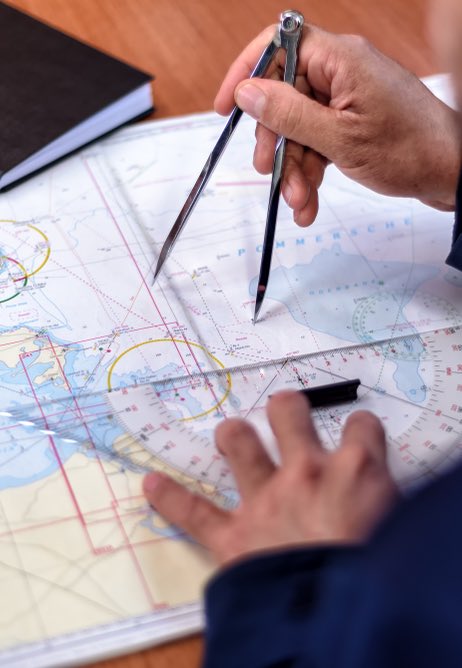
Yachtmaster Offshore Practical
Although there is no formal training course leading up to the RYA Yachtmaster Offshore Practical exam, it is common for yacht crew to complete a practical training course, leading up to the exam. This may vary slightly between schools but should be done at an RYA accredited center.
The exam will include an assessment of your skippering skills, boat handling, general seamanship, navigation, safety awareness and knowledge of the IRPCS, meteorology and signals.
RYA Yachtmaster Offshore Practical Exam:
A valid GMDSS-approved SRC Radio Operators Certificate and a First Aid Certificate are requirements for the RYA Yachtmaster Practical examination. The Elementary First Aid Certificate as acquired during STCW Basic Training is an accepted version. For recreational sailors, an RYA First Aid certificate is sufficient.
In addition to this, candidates need to ensure that they have met the minimum sea time prerequisites as highlighted above.
Practical Exam Assessment:
The exam will include an assessment of:
- The candidate's skills as a captain,
- Boat handling ability
- General seamanship,
- Navigation planning and execution
- Safety awareness and procedures
- Knowledge of the IRPCS,
- Meteorology,
- Lights, shapes, sounds, and other signals.
Practical Exam Duration:
- 8-12 hours for 1 candidate,
- 10-18 hours for 2 candidates.
- No more than two candidates can be examined in 24 hours and no more than four candidates can be examined in one 2-day session.
RYA Yachtmaster Offshore Certificate
Students who pass their Yachtmaster Offshore practical and theory examinations will be awarded an RYA Yachtmaster offshore certificate of competency. It is important to understand that CoC is a recreational license until it is commercially endorsed by the MCA.
RYA Yachtmaster Offshore Commerical Endorsement
In order to commercially endorse your Yachtmaster offshore certificate, you will need to submit the following:
- Original Yachtmaster Offshore certificate
- RYA Professional Practices and Responsibilities certificate
- an RYA commercial endorsement application form
- Your original, completed ML5, ENG1 , or an ENG1 equivalent medical form.
- A copy of your RYA Basic Sea Survival certificate or STCW Personal Survival Techniques
- A copy of your RYA Marine Radio SRC Certificate or other acceptable GMDSS Marine Radio Operator's Certificate .
- A passport-sized photo with your name on the back
- The application fee
RYA Yachtmaster Offshore License
A license card/ book will be provided to those who pass the relevant Yachtmaster offshore examinations. The license will include a photo, and details about the license holder, and will also include information about the endorsements associated with the license.
RYA Yachtmaster Offshore Training School Locations
Brazil Sao Paulo
Croatia Split
Greece Corfu
South Africa Cape Town Langebaan

Spain Barcelona
Turkey Marmaris
United Kingdom England Ireland Scotland
West Indies Antigua
Username or Email Address *
Remember me Lost your password?
Username or Email
Get New Password
Impartial training and careers advice
Call us: +441983 280 641
+441983 280 641
Requirements for Yachtmaster Offshore exam
There is some confusion around the requirements for the RYA Yachtmaster Offshore Coastal or Offshore exam. We hope this guide helps explain these requirements.
Whats covered
In this post, we will answer the following questions:
Sea time requirements for the Yachtmaster Offshore exam
Qualifying passages.
- If my sea time is all on Superyachts
- How to record my sea miles
Converting from sail to power
- What first aid qualification do I need
- Power or Sail?
Commercial endorsement
- Do I need RYA Yachtmaster Theory
- What other skills do I need for the RYA Yachtmaster
To sit the RYA Yachtmaster offshore exam, you are required to have, as a minimum, the following experience. All completed within the last ten years:
- A minimum of 2,500 miles are logged before you sit the exam. At least half the sea time must be in tidal waters.
- 50 days at sea on yachts up to 500GT.
- During your qualifying sea time, you would have completed five passages of over 60 miles **. Two of these passages would have been at night, and two acting as skipper. All five qualifying passages must have been on a vessel between 7 and 24m in length.
- At least five days experience as skipper.
- Please note if you hold an STCW Elementary First Aid, then it must have been issued in the last five years .
- For RYA First Aid, it’s three years.
- A GMDSS short-range VHF radio certificate
Click here if you need to refresh your STCW Elementary First Aid or complete a GMDSS short-range VHF course .
To sit the Yachtmaster Offshore exam, you MUST have completed at least five passages of over 60 miles.
A 60-mile qualifying passage is defined as:
A non-stop voyage from departure port/anchorage A to departure port/anchorage B (Points A and B can not be the same place).
The 60-mile passage must be a continuous passage. The distance, in this case 60 miles, must be measured as a straight line from port A to port B.
**Qualifying passages must be completed on a vessel less than 24 meters.
Acting as Skipper
The skipper is the person nominated and responsible for planning the passage. The skipper is not necessarily the most experienced or qualified person on board but must be the person with responsibility for the safe execution of the passage.
If the skipper’s role is transferred to another person at any time during a passage then neither person can claim to have skippered that passage.
What if all my sea time has been on Superyachts/vessels over 24m in length?
The RYA accepts that 50% (1,250) of the qualifying sea miles gained on a vessel over 24m can be used towards the 2,500 miles required for the Yachtmaster Offshore exam.
You should provide a testimonial or Discharge book confirming 1,250 sea miles.
The other 50% of the qualifying sea time must have been completed on vessels between 7 and 24 meters in length . Some Superyachts have large tenders and chase boats. In this case, any miles gained at the helm go some way to 1,250 sea miles.
Sea time requirements for RYA Yachtmaster Coastal
- 30 days at sea on a vessel less than 24m in length, and a minimum of 800 miles logged before you sit the exam. At least half the sea time must be in tidal waters.
- Two days as skipper, on a vessel less than 24m in length.
- 12 night hours.
- Short-range radio certificate (VHF), or equivalent.
- A valid First Aid certificate.
- You must be 17 years old at the time of the exam.
If you hold the RYA Coastal Skipper course completion certificate, then the miles required for Yachtmaster Coastal are reduced to 400.
To convert from Yachtmaster offshore sail to Offshore (Power) you must have completed, in the last 10 years:
- Minimum of 1,250 miles on a vessel between 7 and 24 meters in length
- 25 days living onboard
- 3 days as skipper
- Three passages of over 60 miles, including one overnight and one as skipper
How do I record my sea time for the RYA Yachtmaster exam?
The miles that you have gained on vessels between 7 and 24 meters in length in the past ten years can be recorded in either:
- RYA’s G158 logbook
- A CV detailing your sea time
- An Excel spreadsheet
When recording experience at sea, make sure you detail the following:
- Dates the passage/trip took place.
- Name and type of vessel
- Details of the passages
- Miles sailed on the passages
- Night hours (if applicable)
Flying Fish has created a simple spreadsheet that you can use to record your sea miles. Yachtmaster power personal log
What First Aid Qualification do I need for the RYA Yachtmaster Offshore?
You must have a valid, in-date first aid qualification to sit the Yachtmaster Coastal or Offshore exam. RYA first aid, STCW, Seafish first aid certificates are all accepted by the RYA.
If you hold the STCW Elementary First Aid certificate that was issued more than 5 years ago, then you will need to refresh your first aid qualification before sitting the Yachtmaster exam.
Power or sail?
The RYA offers two practical schemes depending on whether you want to skipper a Power or Sail. boat. Both schemes lead to the RYA/MCA Yachtmaster Offshore Certificate of Competence. The requirements for the Yachtmaster Offshore power or sail qualification are the same, minimum of 2,500 miles, etc.
Many choose to commercially endorse their RYA Yachtmaster Coastal or Offshore exam qualification after completing the RYA Yachtmaster exam. If this is your chosen path, then in addition to holding a valid first aid and VHF certificate listed above, you will need the following:
- Either an ENG1 or ML5 medical
- STCW or RYA Sea survival certificate
- Complete the RYA’s online PPR course
Once you have completed these three steps, you can apply for commercial endorsemen t through the RYA.
STCW Endorsement
Complete STCW Basic Safety Training , then the RYA/MCA Yachtmaster Offshore certificate will be endorsed to allow the holder to skipper a commercial or privately owned vessel up to 200 gross tonnes, which may be greater than 24m in length.
Do I need RYA Yachtmaster Theory?
In short, yes. To become an RYA Yachtmaster offshore then, you need to be able to navigate as well as handle the boat at sea. Furthermore, holding the RYA Yachtmaster Theory as well as your Yachtmaster Offshore certificate of competence is required if your goal is the Officer of the Watch 3000GT. If you have not sat at the chart table for a while, then consider a combined Yachtmaster Offshore Theory and practical prep course .
What other skills do I need before I join a prep course?
If you are considering a Yachtmaster Prep course then Flying Fish will provide some pre-course reading. If you did some background reading before your prep course, it would help if you had a good knowledge of the following:
- I.R.P.C.S (rules of the road) and distress signals.
- Weather. The passage of frontal depression, sea breeze, fog, effects of wind and tide, and terminology used in a weather forecast.
- Navigation. Understand how to calculate tidal heights, course to steer, and estimated position.
- Ability to tie the basic knots.
- Have knowledge of Radar, rule 19, and how to use it for collision avoidance.
- The G158 logbook provides all sea time requirements and a section where you can record all your sea time.
- Account icon Log in
- Basic Safety Training
- Refresher (Fire & PST)
- Elementary First Aid
- Fire Prevention & Fire-fighting
- Personal Survival Techniques
- Advanced Fire Fighting
- Advanced Fire Fighting Refresher
- Proficiency in Security Awareness
- Personal Safety & Social Responsibility
- Crowd Management / Crisis Management and Human Behaviour
- Powerboat Level 2
- PWC/Jet Ski License
- PWI/Jet Ski Instructor
- PWC + PWI Pack
- Pack PB2 & PWC
- Day Skipper
- Shorebased Yachtmaster Theory
- Yachtmaster Practical Preparation & Offshore Exam
- Yachtmaster Offshore Package
- Full Deckhand Pack
- Full Interior Pack
- Basic Deckhand Pack
- Basic Interior Pack
- Full Tender and Jet Ski Pack
- Tender Pack
- Jetski Pack
- Yacht Deckhand Training
- Yacht Steward/ess Training
- Basic Food & Beverage Services
- Basic Housekeeping & Laundry Services
- Basic Wine, Bartending & Mixology
- Food Safety Level 2
- ⚡Lithium-ion Battery Safety Awareness on Superyachts
- VHF Short Range Certificate
- RYA Professional Practice & Responsibilities
- RYA Essential Navigation and Seamanship
- RYA Online Coastal Skipper/Yachtmaster Theory
- RYA Online Day Skipper Theory
- STCW PDSD for Superyachts
- STCW PDSD for Cruise Ships
- Useful Information
- Steward/ess
Yachtmaster Offshore: When, Why, and How
In a seafarer’s career, there comes the time when Yachtmaster ticket becomes either a necessity, or the next logical step in professional development. No matter what the reason for the course is, Yachtmaster Offshore requires a thorough preparation and planning as well as some prior knowledge and experience.
- When am I ready to take the course?
The candidate’s eligibility for Yachtmaster Offshore program is defined by a number of requirements. First and foremost, the logged sea time must show a minimum of 2500 nautical miles, about half of which should be in tidal waters. There is a huge debate as to what tidal waters are, and the RYA leaves it to the Yachtmaster candidate to decide whether the passage they undertook happened in a tidal area. The definition offered by the RYA is as follows:
An area is deemed tidal if published stream, current or tidal range data is available, the influence of which is significant enough to require the effects to be taken into account to plan and execute a safe and efficient passage .
But even if the decision to call experience tidal is the candidate’s, the RYA wisely warns that the final judgement will be made by the examiner and recommends to list only those miles that can be backed up with evidence. The qualifying sea time should be gained on motor vessels if the candidate applies for Yachtmaster Offshore Motor license. Sail miles do not count.
The RYA also sets a requirement as to the number of qualifying passages. As defined by the Association, ‘a passage is a non-stop voyage from a departure port / safe haven to a destination port / safe haven ’. For the Yachtmaster Offshore , there must be a minimum of 5 passages over 60 nm each; 2 of those passages should be overnight and 2 when the candidate acted as a skipper. The skipper, as understood by the RYA , is a person nominated and responsible for the planning and execution of a passage including vessel and watch management . It’s important that throughout the 60-mile passage there occurs no change of skippers; otherwise, the passage cannot be deemed as qualifying.
Proper understanding of the skipper’s role is vital for ticking the box of another requirement – 5 days on board acting as a skipper. A day in this case is a period of 8 consecutive hours, and the majority of them should be at sea . In every 24 hours, Yachtmaster candidate can have only one qualifying day onboard.
Last but not least, the RYA’s Yachtmaster Offshore exam pre-requisites put some restrictions as to the tonnage and length: days on board and miles should be gained on vessels up to 500 gt and less than 24 meters LOA.
- When is the best time to take the RYA Yachtmaster Offshore course?
The full program – RYA Yachtmaster Offshore theory and RYA Yachtmaster Practical – takes 10 days to complete; the exam is usually scheduled right after, and candidates need to allow 2 days for it. With the sea, winds, and weather being unpredictable, to the candidates coming from abroad we advise to add an extra day before taking flights back home. Thus, the course is quite a commitment, and most seafarers take it during low Med season. Our Yachtmaster Offshore course is scheduled every month from December throughout April to give options to potential candidates.
- Why take the RYA Yachtmaster Offshore?
Yachtmaster is not for beginners. Commercially endorsed Yachtmaster Offshore Certificate of Competence entitles its holder to master a yacht of up to 200 gt, and that is a big responsibility. That said, one of the reasons to get Yachtmaster is to advance the qualifications from entry to higher level including MCA Officer of the Watch (OOW) or Chief Mate, for which Yachtmaster Offshore CoC is among the required documents. Yachtmaster Offshore Shore-based (theory) certificate is another pre-requisite to apply for the OOW, and it has to be sent along with STCW and other records as a part of the Notice of Eligibility.
In a scheme of RYA training , Yachtmaster Offshore is preceded by RYA Day Skipper and Coastal Skipper, which allow to navigate 20 and 60 nautical miles offshore accordingly. With Yachtmaster Offshore qualifications, it is possible to skipper a cruising yacht up to 150 miles from harbour, so recreational boaters can have larger areas to explore and longer distances to cover.
- How to apply for Yachtmaster Offshore Program?
If you believe you are ready and meet the pre-requisites mentioned above and outlined on our website , your first step is to get in touch with us by email, phone, or through contact form . Once we receive your enquiry, we will email to you Sea Time Summary and Self-Evaluation forms to fill out, which we will then forward to our instructor to confirm your eligibility. If you are eligible for the course, we will proceed with course booking and securing your place on the training.
Some important things to remember: the candidates for the training should hold a valid Elementary First Aid certificate . For the STCW EFA , it should be issued within the last 5 years, for the RYA First Aid - within the last 3 years. VHF Marine Radio certificate can be offered as a part of Yachtmaster Offshore package , but if you already hold the certificate, we can offer a 100 euros reduction.
Our next Yachtmaster Offshore session starts on the 6 th of December. Click here for more dates.
More questions about Yachtmaster? Let us know!
Leave a comment
Comments must be approved before appearing
* Required fields
Subscribe to our newsletter & be the first to know of training dates & offers
Checkmark icon Added to your cart:

- Mail: [email protected]
- Call Us: +44 (0) 23 8045 8737
RYA Yachtmaster Exam Syllabus
RYA Yachtmaster Exam

In each section the examiner will expect to see the candidate take full responsibility for the management of the yacht and crew.
During the RYA Yachtmaster Coastal Exam the candidate will be expected to demonstrate understanding but may not have had the opportunity to practice all aspects of the syllabus under a range of different weather conditions.
During the RYA Yachtmaster Offshore Exam the candidate will be expected to demonstrate competence based on a more broad experience.
Here is a detailed look at the RYA Yachtmaster Exam syllabus and during your RYA Yachtmaster Exam you can expect to be examined on any of the following subjects
1. International Regulations for Preventing Collisions at Sea
Questions will be confined to the International Regulations and although candidates must be aware of the existence of Local Regulations, they will not be expected to memorise specific local regulations.
- General Rules (1 – 3)
- Steering and sailing rules (4 – 19)
- Lights and shapes (20 – 31)
- Sound and light signals (32 – 37)
- Signals for vessels fishing in close proximity (Annex II)
- Distress signals (Annex M)
Candidates will be expected to know what safely equipment should be carried on board a yacht, based either on the recommendations in the RYA Boat Safely Handbook (C8), the ISAF Special Regulations or the Codes of Practice for the Safety of Small Commercial Vessels. In particular, candidates must know the responsibilities of a skipper in relation to:
- Safety Harnesses
- Lifejackets
- Distress flares
- Fire prevention and fighting
- Knowledge of rescue procedures
- Helicopter rescue
3. Boat Handling
Candidates for Yachtmaster Coastal examinations will be expected to answer questions or deomonstrate ability in simple situations only. Candidates for Yachtmaster Offshore will be expected to answer questions or demonstrate ability in more complex situations and will also be expected to show a higher level of expertise.
- Coming to and weighing anchor under power or sail in various conditions of wind and tide
- All berthing and unberthing situations in various conditions of wind and tide
- Recovery of man overboard
- Towing under open sea conditions and in confined areas
- Boat handling in confined areas under sail
- Boat handling in heavy weather
- Helmsmanship and sail trim to sail to best advantage
- Use of warps for securing in an alongside berth and for shifting berth or winding
4. General seamanship, including maintenance
- Properties, use and care of synthetic fibre ropes
- General deck-work at sea and in harbour
- Engine operations and routine checks
- improvisation of jury rigs following gear failure
4. Responsibilities of Skipper
- Can skipper a yacht and manage the crew
- Communication with crew
- Delegation of responsibility and watch-keeping organisation
- Preparing yacht for sea and for adverse weather
- Tactics for heavy weather and restricted visibility
- Emergency and distress situations
- Victualling for a cruise and feeding at sea
- Customs procedures
- Standards of behaviour and courtesy
5. Navigation
- Charts, navigation publications and sources of navigational information
- Chartwork including position fixing and shaping course to allow for tidal stream and leeway
- Tide and tidal stream calculations
- Buoyage and visual aids to navigation
- Instruments including compasses, logs, echo sounders, radio navaids and chartwork instruments
- Passage planning and navigational tactics
- Pilotage techniques
- Navigational records
- Limits of navigational accuracy and margins of safety
- Lee shore dangers
- Use of electronic navigation aids for passage planning and passage navigation
- Use of waypoints and electronic routeing
6. Meteorology
- Definition of terms
- Sources of weather forecasts
- Weather systems and local weather effects
- Interpretation of weather forecasts, barometric trends and visible phenomena
- Ability to make passage planning decisions based on forecast information
Candidates for Yachtmaster Offshore and Yachtmaster Coastal must hold the Restricted (VHF only) Certificate of Competence in radiotelephony or a higher grade of certificate in radiotelephony.
Full details can be found on the RYA’s website .
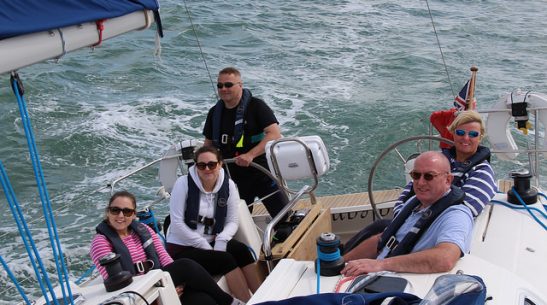
Universal Yachting Ltd
- Terms & Conditions
- Privacy Policy
- DATA REQUEST
- Dufour Yachts
- Boats For Sale
- Yacht Charter
- Marine Services

Universal Yachting Ltd: Mercury Yacht Harbour, Satchell Lane, Hamble, Southampton, Hampshire SO31 4HQ
Call Us: +44 (0) 2380 458737 Mail: [email protected]

Best Coast Water Sports
BCWS is your go-to source for all things related to water sports

How to Become a Yacht Master: A Step-by-Step Guide
Becoming a Yacht Master is an exciting and rewarding journey that allows you to combine your passion for sailing with a promising career path. This comprehensive guide will provide you with the essential steps to becoming a Yacht Master, including understanding the role, meeting prerequisites, obtaining certification, gaining practical experience, advancing your career, and tips for success.
How to Become a Yacht Master in the RYA
To become a Yacht Master in the Royal Yachting Association (RYA), you will need to complete a series of courses and gain the necessary experience.
Here are the steps you can take to become a Yacht Master in the RYA:
- Gain experience : You will need to have a certain amount of experience before you can start working towards your Yacht Master qualification. This usually involves logging a minimum number of sea miles and completing a certain number of hours of helm time.
- Complete the Day Skipper course : This course will teach you the basics of navigation, seamanship, and boat handling. It will also give you an introduction to basic weather forecasting and how to plan a passage. You will need to complete this course before you can progress to the Coastal Skipper and Yacht Master courses.
- Complete the Coastal Skipper course : This course builds on the knowledge and skills gained in the Day Skipper course and focuses on more advanced navigation and boat handling. You will learn about night navigation, pilotage, and passage planning.
- Gain more experience : After completing the Coastal Skipper course, you will need to gain more experience before you can start working towards your Yacht Master qualification. This usually involves logging more sea miles and completing more helm time.
- Complete the Yacht Master theory course : This course covers advanced navigation, meteorology, collision regulations, and safety at sea. It is designed to give you the knowledge required to navigate safely in more challenging conditions.
- Complete the Yacht Master practical exam : This is the final step in becoming a Yacht Master in the RYA. The exam consists of a practical assessment of your boat handling skills, navigation ability, and safety knowledge.
Note that there are different types of Yacht Master qualifications available, depending on the type of vessel you want to operate and the waters you want to sail in. Make sure to choose the qualification that is appropriate for your goals and experience level.
Understanding the Role of a Yacht Master
The Yacht Master is a highly skilled professional responsible for the safe operation and overall management of a yacht. To fully grasp the requirements of this role, it is important to examine both the responsibilities and qualifications involved.
Responsibilities and Duties
Being a Yacht Master comes with a significant set of duties and responsibilities. These include, but are not limited to, ensuring the safety of passengers and crew, managing all onboard operations, maintaining legal and regulatory compliance, and supervising the maintenance and repair of the yacht. Additionally, Yacht Masters often need to act as navigators, assuring the timely arrival at planned destinations while taking into account the weather, sea conditions, and other potential hazards.
Skills and Qualifications
Aspiring Yacht Masters must possess a wide range of skills in order to excel in this demanding profession. Some key qualifications include excellent communication and leadership skills, a strong background in sailing and seamanship, knowledge of navigation and meteorology, mechanical aptitude, and the ability to remain calm under pressure.
Prerequisites for Becoming a Yacht Master
Before starting your journey to become a Yacht Master, you should consider the prerequisites to ensure you are on the right path.
Sailing Experience
Hands-on sailing experience is essential for building the foundation of your Yacht Master career. This includes recreational sailing or working on crewed vessels in various capacities. Many aspiring Yacht Masters begin by obtaining entry-level roles within the yachting industry, such as deckhand or mate, to gain valuable experience.
Required Certifications and Licenses
There are several certifications and licenses required to become a Yacht Master. The specific requirements may vary depending on the jurisdiction where you plan to work, but most countries require the completion of various sailing and navigation courses, like the RYA (Royal Yachting Association) Yacht Master program. These courses and certifications demonstrate your knowledge, skills, and commitment to the profession.
Physical Fitness and Health Requirements
Being a Yacht Master is a physically demanding profession that requires individuals to maintain a high level of fitness and health. It is important to assess your physical abilities and conditions to ensure you can meet the demands of the job. Additionally, some jurisdictions require a valid seafarer’s medical certificate, attesting to your overall health and fitness for work at sea.
Yacht Master Training and Certification
Once you have met the prerequisites, the next step is to obtain the necessary training and certification to become a Yacht Master.
Choosing the Right Training Program
It is crucial to choose a reputable and accredited training program. Look for programs with experienced instructors, proven success rates, and comprehensive curriculums that cover essential topics. The RYA Yacht Master program is one of the most recognized and respected certification systems worldwide.
Essential Courses and Modules
A typical Yacht Master training program consists of multiple courses and modules. Common subjects include navigation, seamanship, meteorology, safety at sea, engineering, and radio communication. Additionally, practical skills such as boat handling, sail trim, and emergency procedures are also covered extensively.
Preparing for the Yacht Master Examination
To become a certified Yacht Master, you must successfully pass the Yacht Master examination. This comprehensive exam assesses your theoretical knowledge, practical skills, and ability to safely command a yacht. It is crucial to dedicate ample time to studying and practicing before attempting the examination to ensure success.

Gaining Practical Experience
Once you have obtained your Yacht Master certification, the next step is to gain practical experience.
Building Sea Miles
Accumulating sea miles is important for both building your skills and enhancing your employability. You can do this by participating in sailing deliveries, joining yacht races or rallies, and working on crewed charters. Each of these experiences will help you become a more proficient sailor and better prepare you for the demands of being a Yacht Master.
Networking and Finding Opportunities
Networking is crucial for securing opportunities in the yachting industry. Attend industry events, join online forums, and connect with fellow sailors to build relationships and stay informed of job openings. This will not only help you find employment but also provide invaluable support and guidance throughout your career.
Learning from Experienced Yacht Masters
Seek out opportunities to learn from and work closely with experienced Yacht Masters. Building a mentorship relationship with someone who has already achieved success in the profession can provide invaluable insights, advice, and practical tips to help accelerate your own career.
Advancing Your Yacht Master Career
Once you have gained experience and established yourself as a competent Yacht Master, it is important to look for ways to advance your career.
Continuing Education and Professional Development
Investing in your ongoing education and professional development is essential for remaining competitive and staying updated on industry best practices. This can include attending industry conferences, enrolling in additional training courses, and obtaining specialized certifications to expand your skillset and expertise.
Joining Professional Associations
Joining professional associations, such as the RYA or the International Yacht Training (IYT) community, offers numerous benefits. These organizations provide access to networking events, job boards, professional resources, and continuous learning opportunities, all of which can help elevate your career.
Exploring Job Opportunities and Specializations
With experience as a Yacht Master, you can explore various job opportunities and specializations within the yachting industry. Some popular career paths include working as a captain of private or charter yachts, managing yacht operations and maintenance, and serving as a consultant or instructor. Pursuing a specialization can lead to increased job satisfaction, better employment prospects, and higher earning potential.
Tips for Success as a Yacht Master
To ensure a successful and fulfilling career as a Yacht Master, consider the following tips:
Developing Strong Leadership Skills
As a Yacht Master, you are responsible for leading and managing your crew. Developing strong leadership skills, such as effective communication, decision-making, and problem-solving, are essential to creating a harmonious and efficient onboard environment.
Staying Updated on Industry Trends and Regulations
The yachting industry is continuously evolving, and staying informed of the latest trends, technologies, and regulations is crucial. Regularly review industry news, engage with your professional network, and attend educational events to keep your knowledge current and maintain your relevancy in the industry.
Balancing Work and Personal Life
Finally, maintaining a healthy work-life balance is essential to your well-being and long-term success in the yachting industry. Set boundaries, prioritize self-care, and make time for personal interests and relationships to ensure you can enjoy a rewarding and enduring career as a Yacht Master.
Register today and get £50 off
Enter voucher code HOME STUDY in the booking form
Online Theory Course
An outstanding course - I can highly recommend this. The details, feedback and support is excellent - makes celestial navigation understandable!

Unravel the mysteries of astro navigation, the sextant, global meteorology and ocean passage making
The online RYA/MCA Yachtmaster Ocean theory course teaches advanced techniques to those aspiring to blue water cruising and is ideal for holders of the Yachtmaster Offshore certificate who are preparing for their first ocean passage, and for commercial Skippers or Mates planning on operating more than 150nm from a safe haven.
This course will introduce you to the principles of astro navigation, the practical use of the sextant, the measurement of time, position fixing by the sun and stars, compass checking and great circle sailing.
You’ll also study the concepts of worldwide meteorology, including tropical revolving storms, and passage planning for ocean voyaging.
- Assumed knowledge Yachtmaster level.
- Minimum duration 40 hours study is specified by the RYA.
- Ability after course Theory knowledge to undertake an ocean passage.
Simply click below to try a free lesson.
Introduction to Astro Navigation
- Introduction & Basic Astro Navigation Theory
- Using a Sextant
- Meridian Passage
- Plotting Your Position
- Planet Sights
- Moon Sights
- Star Sights
- Latitude by Polaris (The Pole Star)
- Compass Check by Sun’s Amplitude
- Ocean Weather & Tropical Storms
- Passage Planning
- Satellite, HF communications and obtaining weather data
Unlimited support from our dedicated RYA Instructors - 365 days a year via email, phone or Skype/Zoom.
14-day unconditional money-back guarantee.
13 fully-narrated online lessons including animations, videos and realistic 3D graphics.
Embedded quizzes with instant feedback in each lesson.
Self-assessment exercises with fully worked answers.
Final exam with detailed instructor feedback and free repeat attempts if requried.
RYA Ocean Yachtmaster Shorebased Theory Course Completion Certificate.
12 months access to study with instructor support and exams - you can extend this if you want.
Lifetime access to training materials once you’ve completed the course.
This course is accessed online with no additional software required.
Lessons are accompanied by optional professional narration, and notes.
They are intuitive and easy to follow, whilst more complex subjects are accompanied by interactive animations and graphics to help you gain a full knowledge of each subject in the course syllabus.
Whilst the process of translating a sextant sight into a position line is straightforward it is quite challenging to get to grips with. Unlike classroom training, where time is limited and students progress at different rates, online learning allows you to participate in lessons as many times as you wish to fully get to grips with the concepts.
At the end of each lesson there are excercises containg similar questions to the exam, with detailed and illustrated answers sent to you immediately to confirm your progress and fully prepare you for your final exams.
You can repeat entire lessons and excercises as often as you wish until you are confident that you fully understand each subject.
When you have completed the course you can request the final exam.
This is assessed by our RYA Instructors and detailed feedback is provided in any areas that may require further study within the course.
If you pass the final exam you will be awarded the RYA/MCA Yachtmaster Ocean Shorebased Course Certificate , which will be posted to you.
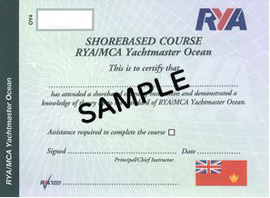
Ad ditional free resits, with suitable Instructor guidance, are available if required.
If you are working towards your Yachtmaster Ocean Certificate of Competence, successful completion of this course exempts you from the written exam.
For most students exam invigilation is not required - see here for examples of when invigilation is required.
Call us for advice on 0238 218 2604
Course reviews.
Nigel Andrews
Helped me master it
This was my third attempt at an RYA Yachtmaster Ocean online course from different companies, and by far the best. For an admittedly difficult subject matter to get one’s head around, the instructor presents a very organized and understandable series of lessons that combine learning with wisdom and humour. Its still a tough subject, but this course helped me master it. Thanks!
Mathew Myatt
Ability to repeat when in doubt
Logical and clear. What was really good was the ability to go back and repeat or all or part of a lesson to ensure you truly understand a concept / principle, something which is more difficult to do when in a real classroom situation
David McIntyre
An excellent course
I found this course to be very comprehensive and informative. The format was very well presented and clear. The main advantage for me was the convenience of doing this in your own time. They are very generous with this. All my correspondence was very promptly replied. They are certainly very on the ball. The instructors gave clear and prompt feedback.
David Collins
Well worth the investment. Excellent!
A challenging course which stretches you but backed up with excellent coaching and instructor support. Worth the investment in time and money. Highly recommended.

Combined - RYA Day Skipper & Yachtmaster to fast track your theory learning

About Kraken
Find out more about Kraken Yachts. Check out the latest Kraken in-build at our bespoke factory in Turkey or meet the team behind the yachts.
Kraken Design
Kraken Yachts are the safest blue water sailing yachts in build today. Find out what makes our yachts so special.
Kraken News
Stay up-to-date with everything Kraken Yachts. See our reviews in yachting magazines from around the world or find out about Kraken Yachts and all things sailing in Ocean Sailor Magazine.

Get more from Kraken Yachts . Watch, listen and read everything about bluewater sailing.

Kraken Yachts
In development.

Mariner’s Weather Handbook
By Steve & Linda Dashew
Published by Beowulf, 1998, First edition. This book covers the whole subject of weather; what makes it, how to read it, how to predict it ; jet stream to wave patterns, low pressure tactics to hurricane avoidance, and everything in between, Steve and Linda Dashew leave nothing out.
In over 200,000 miles of sailing they have seen less than 48 hours of serious weather as a result of their expertise, but as this indomitable pair say in the introduction: ‘Weather is the ultimate variable…we feel it is always better to take the most conservative approach. This may result in a few extra miles sailed, or a delayed departure, but in the end, the passages are usually over more quickly…and are a lot more comfortable.’
Share this post
Are you subscribed, be the first to know when we release new content, sign up today so you don't miss a thing, more reviews from the ocean sailor.
There’s plenty more to read at Ocean Sailor. Check out some more articles…

The Five-Year Voyage

Wandering for Less

The Last of the Windjammers Volume 1 & 2

Along the Clipper Way
© All rights reserved Kraken Yachts 2024
Designed & created by Oncrowd

Lorem ipsum dolor sit amet, consectetur adipiscing elit. Ut elit tellus, luctus nec ullamcorper mattis, pulvinar dapibus leo.Lorem ipsum dolor sit amet, consectetur adipiscing elit. Ut elit tellus, luctus nec ullamcorper mattis, pulvinar dapibus leo.

Yachtmaster Theory Quiz
Test your knowledge with these 10 theory questions. The quiz is aimed at those planning to join us for a Yachtmaster Coastal or Offshore preparation week. This is NOT an admission test, but it is meant for you to check your theory knowledge and identify any gaps, so they can be filled before you join us for the practical week. Remember, whilst we will also review your theory notions, there will be no time to actually study them if you don’t know them already. And these are only a small sample of what the Yachtmaster examiner may be asking! If your score is not good, please consider signing up for the Yachtmaster Shorebased theory course. Fill in your name and email and click on Start. Select your answer and move onto the next question. At the end of the quiz you will see how you scored and you will be able to review the correct answers.
Yachtmaster - pre test
Test your knowledge with these 10 theory questions. The quiz is aimed at aspiring RYA Yachtmaster Coastal or Offshore. Select your answer and move onto the next question. At the end of the quiz you will see how you scored and you will be able to review the correct answers.
Hi, welcome to our Yachtmaster quiz page, where you can informally test your knowledge before attending one of our courses. Please fill out the information below:
What additional lights does a pilot vessel show whilst on duty?
You hear three horn blasts from a big vessel. What is she communicating?
What is the name of the line that points from you to a target on a Radar screen?
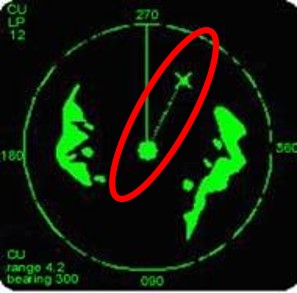
What is the compass course to be followed to hold a True course of 145 degrees?
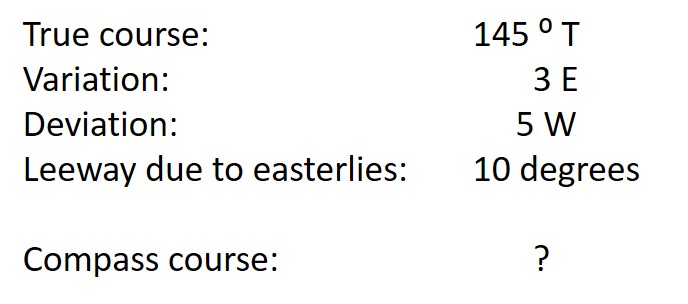
What is the name of the fog that typically forms at sea?
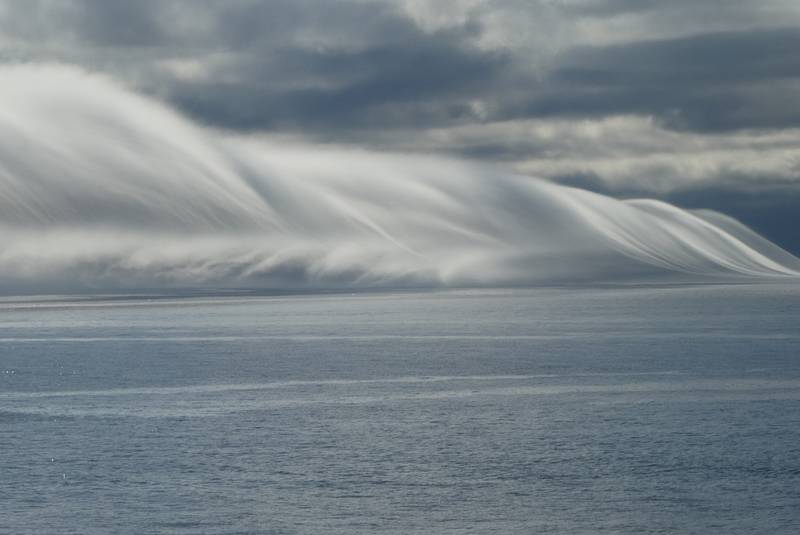
What is the name of this buoy?
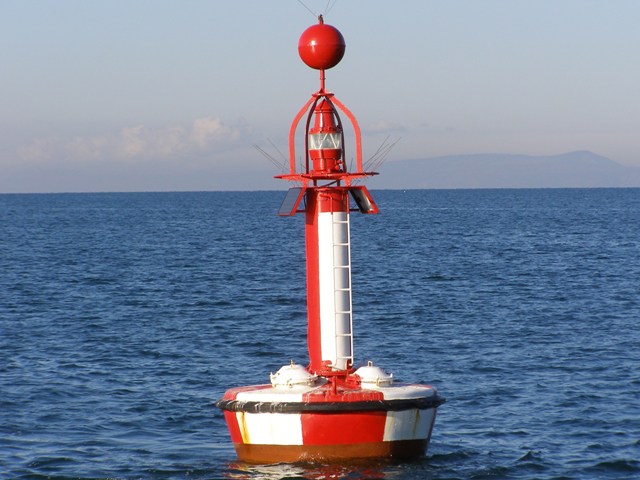
What vessel would show these lights?

What is the name of the Angle of Heel at which a vessel will capsize?
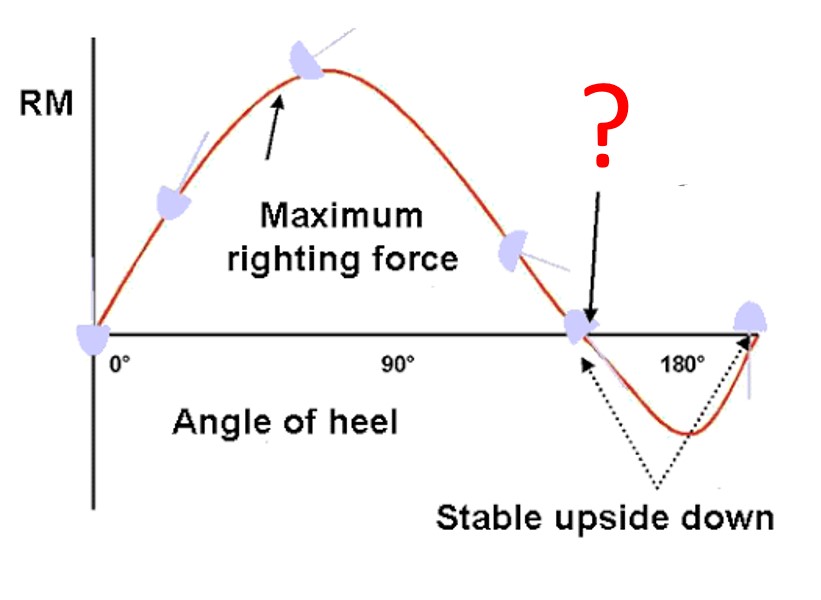
What happens to the wind after a cold front has passed (Northern hemisphere)
What is the meaning of this mark?

Your score is
Restart quiz
Please rate this quiz
Privacy Policy Designed using Hoot Business Premium . Powered by WordPress .
Read About Our Exciting New Developments in 2024
3 week Yachtmaster Academy
****new for 2024****.
Over the last 10 years, we have trained hundreds of Yachtmaster Coastal and Offshore Candidates and we are proud of our pass rate. W e are constantly looking for ways to improve our offering and this is where the idea of this newly designed Yachtmaster Academy was born.
Our 3-week Yachtmaster Academy can cater to many different abilities, from those who simply want extra time on board our boat before the exam in order to hone their navigation skills, to those who require the last couple of 60nm passages for their Yachtmaster Offshore qualification.
3 week course £2995 + Yachtmaster exam fee
Click for Details, Dates & Booking
Pre Course:
Included in the cost is a copy of the RYA Navigation Exercises book along with 2 training charts, plotters, dividers and a USB Memory stick with extensive chartwork videos and resources for pre-course study.
Week 1: Yachtmaster Theory Course
A 7-day intensive navigation course looking in detail at IRPCS, Chartwork, Passage Planning, Meteorology, and more.
Week 2: Mile Builder
A 5-day practical course putting into practice all the theory from the week before whilst ticking off the last few miles for the Yachtmaster Exam. The emphasis of these 5 days is putting into practice Passage Planning, Pilotage, Electronic Nav, and Radar. This is a fully residential course and, weather dependent, you should get the chance to visit Belfast and Islay before making your way back into the Clyde.
Week 3: Yachtmaster Prep & Exam
The final stage of the course is our 4 day Yachtmaster Prep which is the perfect opportunity to perfect your boat handling and pilotage skills in preparation for your Yachtmaster Offshore Exam on Day 5 & 6.
We have the ability to tailor a package to your exact needs, whether that would be completing your Day Skipper theory course, 1:1 theory training, completing your additional commercial endorsement courses or something else. Please contact us for information.
Click here to download the course flyer.
< All Courses
Neptune Maritime Training Sail & Power
Contact details
- ქართული ენა
Temperature
Precipitation, weather today moscow.
- Weather Today
Sun elevation
Radar and precipitation nowcast for moscow.
The location marker is placed on Moscow. This animation shows the precipitation radar for the selected time range, as well as a 2h forecast . Orange crosses indicate lightning. Data provided by nowcast.de (available in USA, Europe, Australia). Drizzle or light snow fall might be invisible for the radar. Precipitation intensity is colour coded, ranging from turquoise to red.
Current satellite and rain images for Moscow, Russia
The real-time satellite image combines visible light during daytime with infrared radiation during nighttime. At night, the image is not dark as infrared radiation can detect temperature differences. Unfortunately, low clouds and fog are difficult to distinguish from ground temperatures and thus can be almost invisible during the night. Meteosat satellite images for Europe are updated in real-time every 5 minutes. GOES-16/GOES-17 (North & South America) and Himawari (Asia) images update every 10 minutes.
© 2024 meteoblue, NOAA Satellites GOES-16 and EUMETSAT . Lightning data provided by nowcast .
More weather data
Meteogram agro, air quality & pollen.
- Weather Maps
- Website Widgets
- Weather APIs
- Climate Services
- Website Help
- Website Subscriptions
- Weather Apps
- Terms & Conditions
Advertising is essential to maintain our free website with unique detail and accuracy.
Please whitelist www.meteoblue.com on your ad blocker or consider buying one of our products:
Already have a subscription? Then please login .
Moscow, Moscow
Around the globe, hurricane tracker.
Severe Weather
Radar & Maps
News & features, today's weather.
Mon, Mar 18
Breezy in the morning; otherwise, cloudy Hi: 37°
Tonight: Mostly cloudy; breezy late Lo: 32°
Current Weather
Looking ahead.
Snow flurries Tuesday
WinterCast®
Lasting 8 hours
Moscow Weather Radar & Maps
Hourly Weather
10-day weather forecast.
Breezy in the morning; cloudy
Night: Mostly cloudy; breezy late
Very windy; a bit of snow
Clear and windy
Considerable clouds
Clouds breaking for some sun
Becoming cloudy
Times of clouds and sun
Mainly clear
A wintry mix in the morning
Partly to mostly cloudy
Colder with periods of rain
Snow and rain
Cloudy with afternoon rain
Rain mixing with sleet
Rain and ice in the morning
A little evening rain
Sun & Moon
Air quality.
Health effects can be immediately felt by sensitive groups. Healthy individuals may experience difficulty breathing and throat irritation with prolonged exposure. Limit outdoor activity.
Allergy Outlook
Top Stories
Spring storms to bookend the week along the Gulf, Southeast coasts
2 hours ago

Weather News
Iceland volcano erupts, prompting evacuation of Blue Lagoon
4 hours ago

March 12-15 marked biggest severe outbreak of 2024 so far in US
3 hours ago

Winter Weather
Winter weather to linger into first full day of spring in Northeast

Weather Forecasts
Topsy-turvy weather pattern to continue over West into this week

Featured Stories
Photo Blog: Aurora photographer captures strange spiral in the sky
LATEST ENTRY
Portal to another dimension or SpaceX rocket?

World's heaviest blueberry grown in Australia

Flint, Michigan, held in contempt for not replacing lead water pipes

How this beautiful Spanish tourist city became the green capital of Eu...

NASA to accept astronaut applications through April 2

Weather Near Moscow:
- Balashikha , Moscow
- Khimki , Moscow
- Zelenograd , Moscow
We have updated our Privacy Policy and Cookie Policy .
Get AccuWeather alerts as they happen with our browser notifications.
Notifications Enabled
Thanks! We’ll keep you informed.

IMAGES
VIDEO
COMMENTS
The meteorology tuition includes the taking and interpretation of forecasts, plotting of weather systems as well as weather prediction. Further courses. Many people who jump straight into Yachtmaster Theory may find that it turns up a weakness or gap in their knowledge.
SIGNS CHART. RADAR COURSE. 1:1 ON YOUR DATE. Weather at Sea. Weather Presentation - Causes, fronts, passage of a depression, forecasts, synoptic charts, etc - all you need to know for RYA Day Skipper and Yachtmaster. Take the test - Yachtmaster and Day Skipper Weather quiz. Clouds and weather on one page - Clouds and weather forecasting.
Tom Cunliffe explains how to pass your Yachtmaster exam. The only certificates accepted by the authorities are those issued after an at-sea examination. To become a fully-fledged Yachtmaster, the practical test is the only one that counts Credit: Graham Snook/YM. TAGS: Practical seamanship sailing skills Yachtmaster.
Embark on a journey to enhance your boating prowess with Above & Beyond Boating's RYA Online Coastal Skipper and Yachtmaster Theory Course. This comprehensive program, tailored for seasoned boaters, focuses on navigation and meteorology, strongly emphasising mastering passage making. Through 12 units of dynamic content, quizzes, and online assessments, you'll delve into crucial topics such as ...
The Yacht master offshore consists of two components: Yachtmaster Offshore Theory ; ... Weather predictions using a barometer. Certificate issuing criteria; Yachtmaster Offshore Theory Online . The RYA Yachtmaster Offshore Theory can be studied in an online or virtual distance learning format. The online version of the course allows students to ...
Like other British sailing schools, Sunsail's prep course (a highly recommended prerequisite to the RYA Yachtmaster exam) is a five-day on-the-boat affair. After that, the RYA examiner comes on board and tests two people at a time in succession. Since there were four of us, the exam would take two full days and nights.
Weather. The passage of frontal depression, sea breeze, fog, effects of wind and tide, and terminology used in a weather forecast. Navigation. Understand how to calculate tidal heights, course to steer, and estimated position. Ability to tie the basic knots. Have knowledge of Radar, rule 19, and how to use it for collision avoidance.
The full program - RYA Yachtmaster Offshore theory and RYA Yachtmaster Practical - takes 10 days to complete; the exam is usually scheduled right after, and candidates need to allow 2 days for it. With the sea, winds, and weather being unpredictable, to the candidates coming from abroad we advise to add an extra day before taking flights ...
Very high waves (9m) long breaking crests High waves (7m), spray affects visibility. Dense streaks of foam along the direction of wind; crests of waves begin to topple and roll over. Moderately high waves (5.5m), breaking crests. Foam blown in streaks. 4m waves. Sea heaps up, spray, breaking waves, foam blows in streaks.
Interpretation of weather forecasts, barometric trends and visible phenomena; Ability to make passage planning decisions based on forecast information; 7. Signals. Candidates for Yachtmaster Offshore and Yachtmaster Coastal must hold the Restricted (VHF only) Certificate of Competence in radiotelephony or a higher grade of certificate in ...
Complete the Yacht Master theory course: This course covers advanced navigation, meteorology, collision regulations, and safety at sea. It is designed to give you the knowledge required to navigate safely in more challenging conditions. Complete the Yacht Master practical exam: This is the final step in becoming a Yacht Master in the RYA. The ...
13 fully-narrated online lessons including animations, videos and realistic 3D graphics. Embedded quizzes with instant feedback in each lesson. Self-assessment exercises with fully worked answers. Final exam with detailed instructor feedback and free repeat attempts if requried. RYA Ocean Yachtmaster Shorebased Theory Course Completion ...
Description. This Yachtmaster course is designed to help you pass your RYA Yachtmaster shore based chart work exam with confidence and as an aide memoire prior to taking the practical Coastal Skipper course and exam and the Yachtmaster exam. At Yachtmaster level we always allow for Deviation and we will have to Compute the tidal rate.
In over 200,000 miles of sailing they have seen less than 48 hours of serious weather as a result of their expertise, but as this indomitable pair say in the introduction: 'Weather is the ultimate variable…we feel it is always better to take the most conservative approach. This may result in a few extra miles sailed, or a delayed departure ...
RYA Yachtmaster Offshore. 44 terms. Kylie_Barrows5. Preview. Sail Trim. 9 terms. igor_tchouiko. Preview. APES Chapter 3 Test. 71 terms. casemak25. Preview. RNR 2031 Exam 1. 45 terms. Franch56. ... HP areas usually bring settled weather with light winds and clear skies. The winds blow clockwise. Highs are large, slow moving, and can block low ...
After some requests Adam has sat down and recorded questions and answers about his experience with his Practical and Theory RYA Yachtmaster Offshore course. ...
Yachtmaster - pre test. Test your knowledge with these 10 theory questions. The quiz is aimed at aspiring RYA Yachtmaster Coastal or Offshore. Select your answer and move onto the next question. At the end of the quiz you will see how you scored and you will be able to review the correct answers.
This is a fully residential course and, weather dependent, you should get the chance to visit Belfast and Islay before making your way back into the Clyde. Week 3: Yachtmaster Prep & Exam The final stage of the course is our 4 day Yachtmaster Prep which is the perfect opportunity to perfect your boat handling and pilotage skills in preparation ...
Yachtmaster summary. YM coastal; yachtmaster courses; Yachtmaster offshore; Yachtmaster eligibility; yachtmaster ocean. ocean oral exam; powerboating. powerboat level 2; intermediate powerboat; advanced powerboat; RYA Powerboat Courses, ICC licences, Powerboat training is not just about the licence. RYA powerboat courses in Barcelona ...
Know what's coming with AccuWeather's extended daily forecasts for Moscow, Moscow, Russia. Up to 90 days of daily highs, lows, and precipitation chances.
Radar and precipitation nowcast for Moscow. The location marker is placed on Moscow. This animation shows the precipitation radar for the selected time range, as well as a 2h forecast. Orange crosses indicate lightning. Data provided by nowcast.de (available in USA, Europe, Australia). Drizzle or light snow fall might be invisible for the radar.
Be prepared with the most accurate 10-day forecast for Moscow, ID with highs, lows, chance of precipitation from The Weather Channel and Weather.com
TOMORROW'S WEATHER FORECAST. 12/19. 38° / 35°. RealFeel® 32°. A bit of morning snow; cloudy.